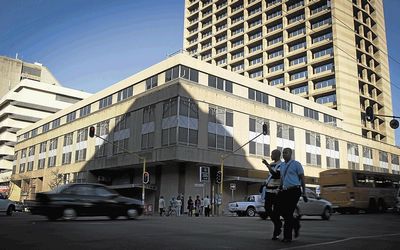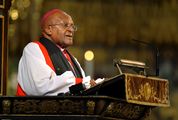BIG BUSINESS think tank, the Centre for Development and Enterprise (CDE), this week launched a series of fascinating "Growth Agenda" reports. Their central thrust is that SA "needs growth that is urban-led, private sector-driven, enabled by a smart state that understands markets, and targeted at mass employment".
The ideas that underlie CDE’s rigorous and evidence-based analysis are not fashionable in the African National Congress (ANC) right now. Nevertheless, optimistic investors and analysts may hope that a rout of the ANC in the local government elections in August could create space for fresh thinking about SA’s conjoined challenges of unemployment, poverty and inequality.
Political scientists have long observed that nothing works better to galvanise a complacent dominant party into action than the shock of defeat. If Johannesburg, Tshwane and Nelson Mandela Bay fall, surely the ANC will be obliged not just to remove President Jacob Zuma but also to initiate significant policy reforms?
A number of obstacles stand in the way of this rosy scenario.
CDE rightly argues that "SA’s future is urban". The current uneasy ambivalence in the ANC about urbanisation therefore needs to be swept away, and fresh powers and capabilities must be assigned to city bosses.
But the great urban centres of Gauteng, if they fall under opposition control in August, are unlikely to be granted extra prerogatives by the national ANC. And provincial leaders may be tempted to obstruct the Democratic Alliance and the Economic Freedom Fighters (EFF) as they attempt to discharge their new responsibilities.
Co-operative governance depends upon a spirit of compromise that may dissipate as competition grows. The further decline of the ANC in urban areas may simply leave ANC provinces increasingly oriented towards rural patronage politics.
CDE argues that inclusive employment growth must be driven by the private sector. Unfortunately, however, the growing public sector is part of a historic process of (middle) class formation that the ANC cannot simply abandon.
The actions required to unlock private sector growth, and to encourage private employment creation, are especially hard for the tripartite alliance to swallow. The Centre’s claim that "a low wage is better than no wage at all" is unlikely to go down well with the Congress of SA Trade Unions (Cosatu), and the ANC is already planning a national minimum wage to counter the EFF threat to its left.
Meanwhile, the think tank’s cogent observation that ANC leaders need to foster pro-business sentiment, if the economy is to grow, is also likely to fall on deaf ears. Luthuli House luminaries are already scapegoating international capital, spreading rumours about attempted regime change by imperialist forces and blaming an "investment strike" by domestic capitalists for slow growth.
CDE is evidently aware that its proposals are unlikely to be an easy sell in the ANC, and this is why a change of leadership matters. Who, though, could hope to drive such a reform programme?
It would be a big step forward for the country if Zuma decided to step down – almost regardless of who stepped in as a caretaker. The dynamics of leadership selection in the ANC’s 2017 elective conference, however, are unlikely to result in the election of a dynamic long-term leadership core committed to a policy revolution. Neither can this conference much change the political dynamics of the national executive committee.
Any aspiring ANC leader hoping to win needs to court power brokers, engage in ethnic mobilisation, rally traditional tripartite alliance constituencies and manipulate electoral procedures. Front-runners will have to do deals in rural provinces where patronage is king, and build alliances with internal constituencies, such as the South African Communist Party and Cosatu, who will view any pro-business agenda with great scepticism. Although policy change is needed urgently in SA, it is likely in practice to be a long haul.
• Butler teaches public policy at the University of Cape Town

Pretoria's central business district. Picture: THE TIMES
BIG BUSINESS think tank, the Centre for Development and Enterprise (CDE), this week launched a series of fascinating "Growth Agenda" reports. Their central thrust is that SA "needs growth that is urban-led, private sector-driven, enabled by a smart state that understands markets, and targeted at mass employment".
The ideas that underlie CDE’s rigorous and evidence-based analysis are not fashionable in the African National Congress (ANC) right now. Nevertheless, optimistic investors and analysts may hope that a rout of the ANC in the local government elections in August could create space for fresh thinking about SA’s conjoined challenges of unemployment, poverty and inequality.
Political scientists have long observed that nothing works better to galvanise a complacent dominant party into action than the shock of defeat. If Johannesburg, Tshwane and Nelson Mandela Bay fall, surely the ANC will be obliged not just to remove President Jacob Zuma but also to initiate significant policy reforms?
A number of obstacles stand in the way of this rosy scenario.
CDE rightly argues that "SA’s future is urban". The current uneasy ambivalence in the ANC about urbanisation therefore needs to be swept away, and fresh powers and capabilities must be assigned to city bosses.
But the great urban centres of Gauteng, if they fall under opposition control in August, are unlikely to be granted extra prerogatives by the national ANC. And provincial leaders may be tempted to obstruct the Democratic Alliance and the Economic Freedom Fighters (EFF) as they attempt to discharge their new responsibilities.
Co-operative governance depends upon a spirit of compromise that may dissipate as competition grows. The further decline of the ANC in urban areas may simply leave ANC provinces increasingly oriented towards rural patronage politics.
CDE argues that inclusive employment growth must be driven by the private sector. Unfortunately, however, the growing public sector is part of a historic process of (middle) class formation that the ANC cannot simply abandon.
The actions required to unlock private sector growth, and to encourage private employment creation, are especially hard for the tripartite alliance to swallow. The Centre’s claim that "a low wage is better than no wage at all" is unlikely to go down well with the Congress of SA Trade Unions (Cosatu), and the ANC is already planning a national minimum wage to counter the EFF threat to its left.
Meanwhile, the think tank’s cogent observation that ANC leaders need to foster pro-business sentiment, if the economy is to grow, is also likely to fall on deaf ears. Luthuli House luminaries are already scapegoating international capital, spreading rumours about attempted regime change by imperialist forces and blaming an "investment strike" by domestic capitalists for slow growth.
CDE is evidently aware that its proposals are unlikely to be an easy sell in the ANC, and this is why a change of leadership matters. Who, though, could hope to drive such a reform programme?
It would be a big step forward for the country if Zuma decided to step down – almost regardless of who stepped in as a caretaker. The dynamics of leadership selection in the ANC’s 2017 elective conference, however, are unlikely to result in the election of a dynamic long-term leadership core committed to a policy revolution. Neither can this conference much change the political dynamics of the national executive committee.
Any aspiring ANC leader hoping to win needs to court power brokers, engage in ethnic mobilisation, rally traditional tripartite alliance constituencies and manipulate electoral procedures. Front-runners will have to do deals in rural provinces where patronage is king, and build alliances with internal constituencies, such as the South African Communist Party and Cosatu, who will view any pro-business agenda with great scepticism. Although policy change is needed urgently in SA, it is likely in practice to be a long haul.
• Butler teaches public policy at the University of Cape Town




















Change: 0.24%
Change: 0.25%
Change: 0.53%
Change: -0.02%
Change: 0.69%
Data supplied by Profile Data
Change: 0.15%
Change: 0.60%
Change: 0.24%
Change: 0.00%
Change: 0.65%
Data supplied by Profile Data
Change: 0.10%
Change: 0.04%
Change: 0.03%
Change: -0.08%
Change: 0.00%
Data supplied by Profile Data
Change: -0.06%
Change: -0.10%
Change: 0.00%
Change: -0.35%
Change: -0.02%
Data supplied by Profile Data